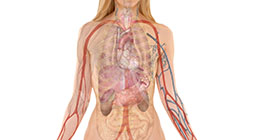
The immune system is involved in promoting pain and inflammation. If the body is injured or has arthritis, for example, several chemicals and immune factors send signals to the brain that cause us to feel pain and create inflammation. If we could inhibit the release of these chemicals and factors, we would be able to control pain and inflammation.
The immune factors associated with pain and inflammation include IL-1, IL-6, IL-8, and IL-12. Carl Germano and William Cabot, in their book Nature’s Pain Killers, state that “IL-1 is directly responsible for breaking down collagen and other connective tissue increasing prostaglandin production and dilating blood vessels—all actions that create pain. IL-6 is a powerful pro-inflammatory factor that contributes to the symptoms in many painful and inflammatory conditions.”
Things That Promote the Switch to “Bad” Immunity
- Sugar suppresses certain immune cells, mainly macrophages and NK cells
- Fats containing trans fatty acids; fried foods and certain margarines suppress immunity
- Stress causes high Cortisol levels, low DHEA, suppresses immunity, and/or causes overactive immunity
- Environmental toxins, including pesticides, lead, mercury, and other heavy metals, suppress immunity and promote inflammation
- Tobacco and alcohol suppress immunity and promote high cortisol and inflammation
COX-2
Some “bad” prostaglandins also cause pain and are made from an enzyme called cyclooxygenase-2, or COX-2. The COX enzyme is actually two enzymes:
- COX-1 provides the very important function of regulating the balance of the environments in the stomach and kidneys, a type of housekeeping for the body.
- COX-2 creates prostaglandins from arachidonic acid.
Those prostaglandins generate the inflammation that causes pain. The challenge facing researchers is neutralizing the COX-2 enzyme activity without suppressing the beneficial COX-1 enzyme. While there are new COX-2 medications available that may do a good job of decreasing the inflammation and pain, they are not without side effects, such as preventing gastric ulcers from healing, inflaming colitis, and being ineffective in soothing the gastric indigestion associated with non-steroidal anti-inflammatory drug use.
Serious Side Effects from NSAIDs
Nonsteroidal anti-inflammatory drugs (NSAIDs), including Motrin, Ansaid, Clinoril, Neproxen, and others, are prescribed to control the pain associated with arthritis. Individuals taking NSAIDs may not be aware of the side effects. Over 20 percent will get an ulcer or gastrointestinal bleeding or even kidney and liver damage. Over 120,000 people per year are hospitalized and 18,000 die from the side effects of NSAIDs.
Joint damage is another side effect from long-term use of NSAIDs. NSAIDs cause joint destruction. Doesn’t it seem strange that you may be taking these painkillers for the pain associated with the joint destruction caused by your arthritis, but the NSAIDs prescribed by your doctor actually cause joint destruction? It is very clear in the published research. One study found that the hip joints of patients taking NSAIDs had greater joint destruction than those patients not taking NSAIDs.
New COX-2 Inhibitor Not So Safe
Celebrex, a new type of NSAID that is touted as much safer than the NSAIDs mentioned above, may not be so safe. Research performed at the University of Pennsylvania Medical Center has found that Celebrex may increase the risk of heart attack and/or stroke. Celebrex is a sulfa drug, like some antibiotics and oral diabetes drugs, so those with sulfa allergies must avoid it. Sulfa allergies affect 5 percent of the population.
Many arthritis sufferers taking Celebrex have found that the gastrointestinal problems they had with NSAIDs still occur when taking Celebrex. Simon Huang, MD, a Vancouver Rheumatologist who led local clinical trials on Celebrex, stated in the Vancouver Sun that “although Celebrex has been found to reduce ulcers in the upper GI tract the effects on the lower GI tract are unknown.”
Prednisone Has Long-Term Side Effects
Prednisone is reserved for the most serious inflammatory, allergic, and autoimmune reactions. Steroid medications like Prednisone can increase your risk of heart disease, diabetes, eye damage, severe osteoporosis, poor wound healing, weight gain, and even cancer. Use steroids as the absolute last resort.
Acetaminophen Dangers
Acetaminophen, which is used to relieve pain and is commonly sold as Tylenol, also has dangerous side effects. Unintentional overdoses are very common. If you are in severe pain, you may be tempted to take too many acetaminophen tablets. Follow the dosing recommendations carefully. Liver toxicity can occur when taking only an extra couple of doses per day. Mixing acetaminophen with alcohol causes acute liver failure. The number one cause of acute liver failure in the United States is acetaminophen overdose and misuse.
Thankfully, nature provides some exciting remedies that treat the cause of pain and inflammation.











